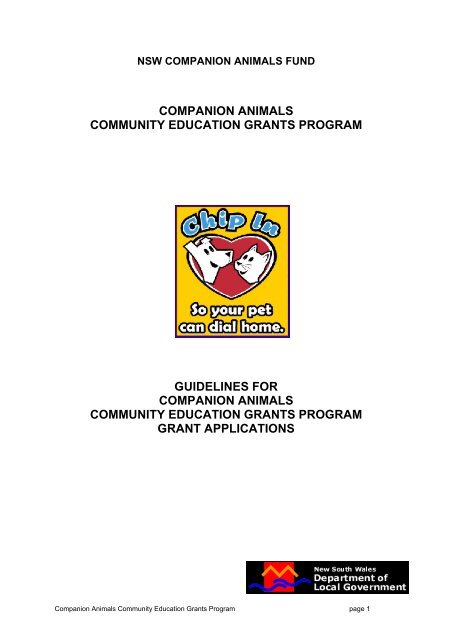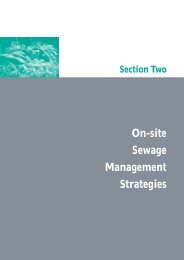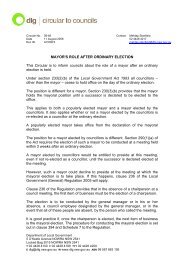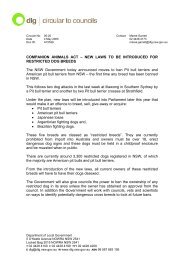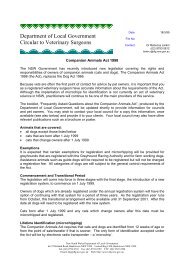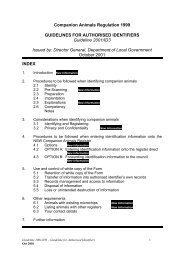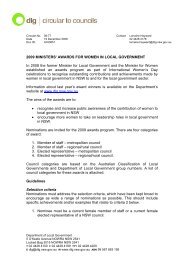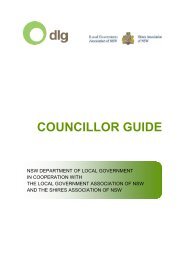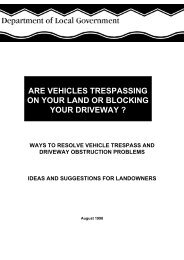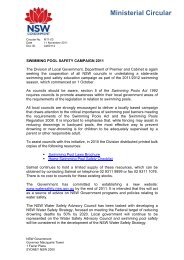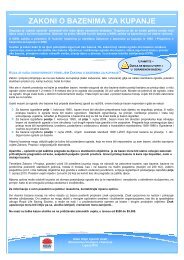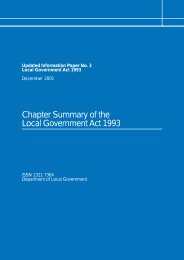Companion Animals Community Education Grants Program
Companion Animals Community Education Grants Program
Companion Animals Community Education Grants Program
Create successful ePaper yourself
Turn your PDF publications into a flip-book with our unique Google optimized e-Paper software.
BACKGROUND TO THE COMPANION ANIMALS COMMUNITY EDUCATIONPROGRAMBACKGROUNDThe <strong>Companion</strong> <strong>Animals</strong> Act 1998 replaces the Dog Act 1966. There was a stagedintroduction of the new Act, with the first stage, relating to general dog controlprovisions, commencing in September 1998 and the final stage, relating to the newmicrochipping and lifetime registration provisions, coming into effect on 1 July 1999.The <strong>Companion</strong> <strong>Animals</strong> Act provides for the microchipping and lifetime registrationof cats and dogs. The aim of the Act is to promote responsible pet ownership, withresulting benefits both for the welfare of cats and dogs and for the generalcommunity by reducing the number of problems caused by pets (eg dog attacks;property damage).As well as a range of enforcement provisions for owners who do not do the rightthing by their animals and the community, the new Act has a strong focus oncommunity education. This is demonstrated by the establishment of the <strong>Companion</strong><strong>Animals</strong> Fund under the Act. A proportion of all lifetime registration fees goes intothe Fund to be used for community education purposes.The Act also provides for the establishment of the <strong>Companion</strong> <strong>Animals</strong> AdvisoryBoard (CAAB) to provide advice to the Minister on a range of matters relating to thecompanion animals legislation, especially community education.Since the establishment of the <strong>Companion</strong> <strong>Animals</strong> Fund in 1999, the CAAB hasbeen responsible for co-ordinating statewide community education campaigns,principally targeting awareness of owner’s responsibilities under the new legislation.Having now passed the initial commencement phase of the legislation, it has beendecided to establish a grants funding program to assist in the development ofcommunity education resource materials. All NSW local councils and not-for-profitorganisations who develop project proposals in partnership with councils may applyfor funding.The <strong>Program</strong> will provide annual grants for discrete, time-limited projects whichproduce community education resource materials that can be used by all NSWcouncils.Funding of up to $200,000 has been allocated for the 2001-2002 year.OBJECTIVE OF THE COMMUNITY EDUCATION GRANTS PROGRAMThe goal of the <strong>Program</strong> is to promote the development of community educationresource materials such as brochures, videos and training materials aboutresponsible pet ownership for use by local councils and other key stakeholders.<strong>Companion</strong> <strong>Animals</strong> <strong>Community</strong> <strong>Education</strong> <strong>Grants</strong> <strong>Program</strong> page 4
The objectives of the <strong>Companion</strong> <strong>Animals</strong> <strong>Community</strong> <strong>Education</strong> <strong>Grants</strong> <strong>Program</strong>are:1. To increase the pool of resources available to all NSW councils forcommunity education2. To acknowledge and support the work being done by NSW councils indeveloping community education resources and utilise their expertise3. To acknowledge and utilise the information and experience of NSWcouncils in identifying priority issues for community education.4. To maximise use of limited resources by avoiding situations where severalcouncils develop the same resource.5. To provide an incentive for NSW councils to develop community edicaitonresources.RESPONSIBLE PET OWNERSHIP AND THE PROGRAMSince the passage of the old Dog Act in 1966 patterns of pet ownership havechanged considerably. <strong>Community</strong> attitudes and expectations about whatconstitutes responsible pet ownership have also changed over this time.The <strong>Companion</strong> <strong>Animals</strong> Act promotes the welfare of animals and balances theneeds of people in the community who own companion animals and those who donot. Responsible ownership includes considering the impact of companion animalson neighbours and the wider community, as well as addressing environmentalconcerns.A companion animal is a cat or dog that one which is kept for the welfare and benefitof both the animal and its owner. If they are to be truly our companions, our cats anddogs need our time, attention, care and control. When animals become a problemfor neighbours or wildlife it is often because they are not being given the care theydeserve.Pets make a positive contribution to our society. Indeed, Australia has one of thehighest rates of pet ownership in the world. Most pet owners act responsibly,providing adequate food, water, shelter, socialisation, training and veterinary care fortheir animals. In the majority of instances, companion cats and dogs are valued andmuch loved members of the family and do not create a nuisance for the community.It is a small number of irresponsible pet owners who cause most problems for thecommunity. Their animals are the ones that roam the streets, pollute public areas,cause property damage, or attack people or other animals. These irresponsiblyowned animals also provide the link between the domestic and feral animalpopulations that do such harm to Australia’s native fauna.The aim of the <strong>Companion</strong> <strong>Animals</strong> Act is to provide for the effective and responsiblecare and management of companion animals by:1. Promoting the welfare of companion animals<strong>Companion</strong> <strong>Animals</strong> <strong>Community</strong> <strong>Education</strong> <strong>Grants</strong> <strong>Program</strong> page 5
2. Promoting community understanding and acceptance of the important roleplayed by companion animals to many people in our society, including thosewho are socially isolated3. Creating a system of permanent identification and lifetime registration forcompanion animals4. Providing a legislative status for cats as well as dogs5. Strengthening the restrictions applying to dangerous dogs6. Reducing the number of animals which are abandoned and euthanased7. Reducing the number of unowned and feral animals8. Promoting local companion animal management planning and controlstrategies.COMPANION ANIMALS ADVISORY BOARDThe <strong>Companion</strong> <strong>Animals</strong> Advisory Board (CAAB) consists of up to 12 personsappointed by the Minister. Persons appointed to the CAAB are nominated by arange of animal welfare and breed associations as well as local government bodies.A list of current CAAB members is at Appendix 1.The function of the CAAB is to provide advice and recommendations to the Ministeron the following matters:1. The implementation and administration of the <strong>Companion</strong> <strong>Animals</strong> Act andRegulations2. The effective management of companion animals3. The keeping and administration of the NSW <strong>Companion</strong> <strong>Animals</strong> Register4. The development of best practice guidelines and the provision of advice andsupport to councils in respect of the management of companion animals5. The facilitation and provision of resources for community education in relationto companion animal care, responsible ownership and management.6. The giving of assistance in the development of training programs for personsengaged in the care and management of companion animals7. The facilitation and provision of resources for research into the companionanimal care and management8. Any matter referred to the Board by the Minister.GRANTS ADVISORY PANELThe Department of Local Government has established a <strong>Grants</strong> Advisory Panel (thePanel) to assist in the assessment of applications for <strong>Community</strong> <strong>Education</strong>Resource Project grants. The Panel has an independent Chairperson and is madeup of suitably qualified people nominated by the following organisations:1. NSW Department of Local Government2. NSW Local Government & Shires Associations3. <strong>Companion</strong> <strong>Animals</strong> Advisory Board4. Australian Local Government Managers Association5. Australian Institute of Environmental Health<strong>Companion</strong> <strong>Animals</strong> <strong>Community</strong> <strong>Education</strong> <strong>Grants</strong> <strong>Program</strong> page 6
ANNUAL REPORTThe progress and outcomes of the <strong>Community</strong> <strong>Education</strong> Resource <strong>Grants</strong> <strong>Program</strong>will be reported in the Department of Local Government Annual Report.COMMUNITY EDUCATION PROJECT GRANTSTotal funding of up to $200,000 for 2001-2002 has been allocated for <strong>Community</strong><strong>Education</strong> Resource Projects. Funding will be provided on a 1:1 matching basis,including in-kind contributions, for projects which are consistent with the program’sFunding Priorities.Individual grants of up to $10,000 are available for <strong>Community</strong> <strong>Education</strong> Projects.The Department of Local Government (the Department) will consider exceptionalprojects organised by regional groupings of Councils for funding up to $30,000 butrecognises the limitation this would place on the number of projects able to befunded.Projects must be discrete, time-limited and produce community education resourcematerials which can subsequently be used by all NSW councils.Intending applicants should obtain the <strong>Companion</strong> <strong>Animals</strong> <strong>Community</strong> <strong>Education</strong>Grant Guidelines and Application Form. These documents are available on the<strong>Companion</strong> <strong>Animals</strong> web site www.dlg.nsw.gov.au.EXAMPLES OF ELIGIBLE PROJECTSThis section describes the types of projects that would be eligible for funding. Thislist is not exhaustive, however it is a guide to the style of projects the <strong>Program</strong> willfund.• Brochures and leaflets• Stickers• Fridge magnets• Children’s swap cards• Videos• Posters• Materials formatted for publication in local and regional newspapers• Radio & TV community service announcements / advertisements• Children’s colouring books / story books / comic books• Resource packs for companion animals fund days• Resource packs for children’s activities• Training packages (eg for children, breeders, pet shops)<strong>Companion</strong> <strong>Animals</strong> <strong>Community</strong> <strong>Education</strong> <strong>Grants</strong> <strong>Program</strong> page 7
FUNDING PRINCIPLES AND CONDITIONS OF FUNDINGWithin the broad framework of the goal of the <strong>Program</strong> the following policy prioritieswill guide the assessment of applications and indicate the responsibilities of grantrecipients.DEMONSTRATED COMMUNITY BENEFITAll funded projects must be of demonstrable benefit to the community.COMMUNITY SUPPORTThe Department is committed to the community’s involvement in responsible petownership. This includes appropriate support by the community of all fundedprojects. ‘<strong>Community</strong>’ in this regard includes both those people upon whom theproject will have a direct impact, as well as those groups within the community with aspecial interest in responsible pet ownership.FUNDING PRIORITIESThe Department recognises that there may be more proposals worthy of supportthan there are funds available and considers that it is better to fund properly a smallnumber of high quality projects, than to inadequately fund a larger number of smallerprojects.The Department will seek to ensure an appropriate geographical spread of fundedprojects and an appropriate mix of themes and strategies. Applications will beassessed so that approved projects cover as many of the following categories aspossible in each funding year.CategoryExamples of issues1. Environment Reducing the impact of dogs/cats on wildlife;reducing dog faeces in public places;addressing noise issues.2. Public safety Reducing dog bites/attacks; reducing strayingdogs/cats; public health issues.3. Caring for Your Pet Caring for dogs/cats; responsible dog and catownership; benefits of microchipping andregistration.4. Human / Pet Relationship Understanding dog and cat behaviour;selecting the right dog or cat; training –obedience etc,<strong>Companion</strong> <strong>Animals</strong> <strong>Community</strong> <strong>Education</strong> <strong>Grants</strong> <strong>Program</strong> page 8
CategoryExamples of issues5. Specialised target groups People of Non-English Speaking background;Aboriginal and Torres Strait Islandercommunities; people with disabilities;children; older people; owners of dangerousdogs.6. Transition from Dog Act Promoting awareness of the end of annualregistration under the Dog Act and the needto transfer to lifetime registration under the<strong>Companion</strong> <strong>Animals</strong> Act.MONITORINGAll projects must contain a monitoring and reporting component aimed atdocumenting progress and demonstrating the extent to which projects have met theirobjectives.INSURANCEIt is a condition of grants that public risk insurance and any other relevant insurancecover be held for all your measures, works and activities. Applicants must makesure that all people employed are protected by workers compensation insurance.EMPLOYING CONTRACTORSThe NSW Government is committed to fair and open contracting of goods andservices. If you intend buying goods or contracting for services as part of yourproject, you must seek and offer fair and reasonable terms. This may include, whereappropriate, calling for tenders.<strong>Companion</strong> <strong>Animals</strong> <strong>Community</strong> <strong>Education</strong> <strong>Grants</strong> <strong>Program</strong> page 9
ADVICE TO GRANT APPLICANTSThis section provides essential information and advice about preparing yourapplication. You should read it carefully if you intend to apply for a grant. Becausethere may be insufficient funds for all applications worthy of support, competition islikely to be very strong. Do not assume that having a good idea is enough. Thinkyour proposal through. Decide on the important aspects and set these out clearly.When writing your application keep in mind:• The funding objectives and principles of the <strong>Program</strong>;• The criteria against which the Panel and DLG will assess all applications;• The fact that you will not be able to change the scope of the funded projectwithout approval from the DLG;• The need to give particular attention to the details of your project’s budget.The larger the grant you are seeking the more details you should provide,especially in your expenditure projections and details of sponsor contributions.The application contains the information the Panel will use to assess your projectproposal. Prepare it carefully, as the Panel may not be able to assess yourapplication if it is incomplete.WHO IS ELIGIBLE TO APPLY?Written expressions of interest are invited from councils or groups of councils.Applications must clearly demonstrate that the project will assist in achievingobjectives stated in a council animal management strategy/plan.Councils or groups of councils may apply for a grant to undertake individual projects.If a group of councils chooses to submit an application, one council should benominated as the lead organisation. The lead organisation will be responsible foradministration of the grant funds and co-ordination of the joint venture activities.Projects developed in partnership between councils and not-for-profit organisationswhich have animal welfare and/or behavior as a core objective are also eligible forconsideration but funding and accountability for project implementation must restwith a local council.NUMBER OF APPLICATIONS PER APPLICANTApplicants may lodge more than one application. Where an applicant submits morethan one application, the comparative priority of each application needs to berecorded on the application, along with details regarding any linkages between theprojects. The Panel and the Department may use this prioritisation when decidingwhich applications will be funded.<strong>Companion</strong> <strong>Animals</strong> <strong>Community</strong> <strong>Education</strong> <strong>Grants</strong> <strong>Program</strong> page 10
RETROSPECTIVE FUNDING<strong>Grants</strong> are not made retrospectively. Funds should not be committed until you havereceived advice in writing of the success of your application and you have agreed tothe conditions of the grant.LINKING PROECTS TO LOCAL COMPANION ANIMALS MANAGEMENT PLANSOne of the priorities of this grant scheme is to fund projects that have been identifiedin or relate to the local companion animals management planning process. TheDepartment recognises that local <strong>Companion</strong> <strong>Animals</strong> Management Plans may nothave been fully developed or documented by the closing date for this grants scheme.Under these circumstances, the applicant should show that the project addresses asignificant animal management issue identified as important locally.The applicant should explain how the project will form part of an overall approach toaddressing an important issue.CONFIDENTIALITYThe Department will use the information you provide to process and assess yourapplication. The Department will not release publicly any information that wouldharm the personal or business activities of any applicant or member of theapplicant’s team. If you require strict commercial confidentiality, you should requestthis in your application.FUNDING FROM MULTIPLE SOURCESApplications must list any other sources of income (direct funding or in-kindcontributions) sought or received from other funding bodies. If funding from othersources is dependent on the success of an application under this funding program,the Department of Local Government may seek a guarantee that the funds areavailable before it approves an application.ACTIVITES NOT FUNDEDThe <strong>Program</strong> will not fund the following:• Activities that are not directly related to responsible pet ownership orcompanion animal management• Activities that are inconsistent with <strong>Companion</strong> <strong>Animals</strong> Act aims andobjectives• Purchase or acquisition of capital equipment• Insurance• overseas travel• Salary of officers who are permanent council employees.<strong>Companion</strong> <strong>Animals</strong> <strong>Community</strong> <strong>Education</strong> <strong>Grants</strong> <strong>Program</strong> page 11
• Staff on-costs (superannuation, loading, workers compensation, etc) of morethan 30%• Purchase of items which would normally be the council’s responsibility, unlessa significant and long-term public benefit can be demonstrated• Continuing administration (including staff) costs of organisationsThe applicant must be committed to the implementation and long-term operation andmaintenance of projects funded by the program.VARIATIONS TO SUCCESSFUL PROJECTSThe Department cannot offer a grant of more than is set out in the application orincrease the value of a grant after the offer has been made except in exceptionalcircumstances. Grant recipients requesting a variation will need to demonstrate thatthe amended project will achieve the same or an enhanced benefit and maintain thecost effectiveness of the project.COMPLEX PROPOSALSIf you have queries about a complex proposal we strongly advise you to consultDepartmental staff before submitting your application.EXCEPTIONAL PROJECTSApplicants requesting a grant of more than $10,000 may be invited to make a shortpresentation to the Panel. This presentation should establish why the Projectproposed is considered exceptional in terms of the objectives of the <strong>Program</strong> and thecircumstances of the project area. When preparing an application for an exceptionalproject you should give particular attention to demonstrating the cost effectiveness ofthe proposal to address the issue. The Department and Panel expect that a highdegree of investigation and planning would be evident in an application for anexceptional project.THE PANEL MAY REQUEST ADDITIONAL INFORMATIONThe Panel may contact the project manager nominated on the application formduring the assessment period. You may also be requested to make a presentationconcerning your application to the Panel.APPLICATION FORMSWe will not send application forms or guidelines by fax. An electronic copy of theapplication can be downloaded from the Department’s website atwww.dlg.nsw.gov.au. You must not expand the application by adding pages unlessa specific note appears in the application, and you must not reduce the font size<strong>Companion</strong> <strong>Animals</strong> <strong>Community</strong> <strong>Education</strong> <strong>Grants</strong> <strong>Program</strong> page 12
elow 10.5 points. If you cannot access the Internet please contact Departmentalstaff and we will send a copy of the file on an IBM-formatted diskette.You must apply on the appropriate application form. Because Departmental staff willphotocopy your application, you must type in the spaces provided on the applicationform. Any attachments must be no larger than A4 size. No colour reproductions willbe made.You need to send two copies of your application. You should also keep a copy ofyour application for your records.The Department will not accept applications sent by fax.CLOSING DATEThe closing date is not flexible. Late applications will not be considered unless prioragreement is made with the Department in exceptional circumstances.The envelope containing your application must be received by the Department orpostmarked by the closing date.INCOMPLETE APPLICATONSThe Department will not accept incomplete applications.You must fill in all relevant sections of your application. It is your responsibility toprovide full and correct information. The Department will consider your applicationincomplete if it is not signed by an appropriately authorised person in yourorganisation (usually the general manager) and/or does not contain all essentialinformation.ASSESMENT OF YOUR APPLICATIONAfter the closing date, Departmental staff will check whether your application iseligible and sufficiently complete for assessment purposes. They will return allineligible or incomplete applications.After your application is registered, the <strong>Program</strong> Manager will write to you confirmingits receipt. You may also be contacted for further information about your applicationor your proposal. Your application is considered first by the <strong>Program</strong> Manager andthen forwarded to all members of the Panel.An agenda will be prepared consisting of all applications, arranged in alphabeticalorder and sent to the Panel. Each Panel member assesses the practicability andoverall worthiness of your proposal using the assessment criteria set out below.Panel members can nominate other, more appropriately qualified people to take theirplaces in assessing particular applications if they think that the nature of certain<strong>Companion</strong> <strong>Animals</strong> <strong>Community</strong> <strong>Education</strong> <strong>Grants</strong> <strong>Program</strong> page 13
applications requires that expertise. Members of the Panel and approved nomineesare required to maintain confidentiality and will not discuss individual applications.After these individual assessments the Panel meets and considers all theapplications. The Panel members reach a common assessment for eachapplication, usually expressed as a single rating figure.If necessary, the Panel may recommend that the Department place conditions on thegrant or that the applicant receive less than the requested amount. The Panel mayalso seek further information from applicants about their proposals before theirapplications are considered in more detail.After the Panel has completed its assessments, a meeting will be held to determinethe successful applicants, using the assessment criteria below. At these meetingsPanel has all applications and the assessments available to them. The Panel maydecide to recommend to grant part of the funding requested rather than the fullamount or to make a grant subject to specific conditions. The decisions of theDepartment of Local Government are final, and there is no appeal process.Given the large number of applications expected, neither the Panel or Departmentalstaff will make specific comments on each application.ASSESSMENT CRITERIA USED BY THE DEPARTMENT AND THE PANELIn assessing the practicability and overall worthiness of each application, Panelmembers will ask the following questions. Projects should specifically promoteresponsible pet ownership. The following questions may assist to help determine ifthe project is eligible for funding:1. Will the project lead to long-term practical improvements in responsible petownership?2. Does the project address an important issue identified in a local companionanimals management plan or address an existing issue that is known to have asignificant impact?3. What is the quality of the proposal in terms of its aims, content, rationale andoriginality?4. Does the application show evidence of:• Appropriately qualified and experienced people• Sound planning• Appropriate management• Proper assessment of the resource requirements for the project• Sound financial administration, including a careful consideration of thecosts involved and the necessary income required to complete the project• Adequate project monitoring methodsYou should consider these criteria carefully when preparing your project application.<strong>Companion</strong> <strong>Animals</strong> <strong>Community</strong> <strong>Education</strong> <strong>Grants</strong> <strong>Program</strong> page 14
INSUFFICENT INFORMATIONYour application may be rejected on the basis that your project proposal does notcontain sufficient information for the Department to assess the project. If timepermits the Departmental staff may contact the project manager nominated in theapplication to request clarification or additional information You should ensure thecontact details are correct before sending your application.GRANTS LIMITS<strong>Grants</strong> are for fixed sums towards projects of a set period of time.NOTIFICATION OF GRANT DECISIONSThe Government will publicly announce the grants. The Department of LocalGovernment will also advise applicants of grant decisions in writing. TheDepartment will not return any applications or supporting material.SUCCESSFUL APPLICATIONSIf your grant application is successful, the Department will negotiate a schedule ofpayment dates with you as soon as practicable after the announcement of thegrants. You will be sent a statement of conditions, which you must acknowledge byreturning a signed acceptance form. The Department will not pay your grant untilyou have signed and returned the form. In most instances progress reports will berequired over the course of the project.Department of Local Government officers and other authorised persons may need tovisit to check progress and where appropriate, collect information or photographswhich will contribute to the overall <strong>Program</strong> evaluation. In this case, the ProjectManager will be notified in advance.The grant conditions require you, among other things, to seek prior approval from theDepartment to alter your project, to respond to any request from the Department forinformation about your project, and to satisfactorily account for your project and grantexpenditure. The grant conditions give details of the consequences of breachinggrant conditions. The <strong>Program</strong>’s standard conditions of grant for projects areattached as Appendix 2.The Department will pay your grant as per the schedule set out in the statement ofconditions. Generally the Department will pay the next installment of your grant aftera satisfactory progress report has been receivedAs a condition of grant, you must acknowledge the <strong>Community</strong> <strong>Education</strong> <strong>Grants</strong><strong>Program</strong> and the companion animals logo in all promotional material or any publicstatement about your funded project.<strong>Companion</strong> <strong>Animals</strong> <strong>Community</strong> <strong>Education</strong> <strong>Grants</strong> <strong>Program</strong> page 15
GRANT ACQUITALYou must provide a final report on your project, including a certified statement ofincome and expenditure. The Department will publish reporting guidelines for finalreports and successful applicants will need to comply with them.FURTHER INFORMATIONThe <strong>Program</strong> staff at the Department of Local Government can help you with anymatter relating to applying for a grant.Address any correspondence about the <strong>Program</strong> or application inquiries to:<strong>Companion</strong> <strong>Animals</strong> <strong>Grants</strong> <strong>Program</strong>C/- Department of Local GovernmentLocked Bag 1500BANKSTOWN NSW 2200Street address:Civic Tower66-72 Rickard RdBANKSTOWN NSW 2200Our e-mail address is pets@dlg.nsw.gov.au.Our website is www.dlg.nsw.gov.au.Our telephone number is (02) 9793-0813.FREEDOM OF INFORMATIONDepartmental documents are available under the provisions of the Freedom ofInformation Act. If you wish to raise a matter under Freedom of Information youshould contact the Director-General of the Department of Local Government.GUIDELINES FOR GOVERNMENT GRANTS PROGRAMSThe Department of Local Government has ensured that its grant programs areconsistent with the Independent Commission Against Corruption (ICAC) reportTaken for Granted? Better Management of Government <strong>Grants</strong>: a CorruptionPrevention Project. You can obtain a copy of this report from ICAC, GPO Box 500,SYDNEY NSW 2001.<strong>Companion</strong> <strong>Animals</strong> <strong>Community</strong> <strong>Education</strong> <strong>Grants</strong> <strong>Program</strong> page 16
APPENDIX 1:2001-2002COMPANION ANIMALS ADVISORY BOARD MEMBERSHIPClr Pam Arnold, chairperson, (nominated by LGA)Dr Ross Burton, deputy Chair (NSW Agriculture)Ms Susie Chaseling (ACAC)Ms Myra Craig, (DLG)Mr Keith Edwards (Cat Protection Society)Ms Denise Ford, (WIRES)Mr Ken Griffin deputy for Dr Rob Zammit (Royal NSW Canine Council)Dr Paul Hansen (NSW Division of the AVA)Ms Julie Hughes (Humane Society International Australian Office)Ms Karen Thorne (NSW RPSCA)Mr Barry Wilton (NSW Animal Welfare League)Official observersMs Terry-Ann Pert (Councils Unite for Pets)Mr Steve Larsen(AILGLEO)Mr Des Bolt (Shires Association of NSW)<strong>Companion</strong> <strong>Animals</strong> <strong>Community</strong> <strong>Education</strong> <strong>Grants</strong> <strong>Program</strong> page 17
APPENDIX 2: DEPARTMENT OF LOCAL GOVERNMENTSTANDARD CONDITIONS OF GRANT FOR COMMUNITY EDUCATIONPROJECTSAcceptance of Grant1. You must accept the conditions of the grant by signing annexure A and returning it to theDepartment of Local Government (DLG) within 60 days.General2. You must carry out the project in accordance with your application and inaccordance with these conditions.3. You must complete the project by or such other date as isapproved in writing by the DLG.4. You must, within 7 days, inform the DLG if you receive funds for the projectfrom any source not specified in your application.5. You must provide any information in relation to the project within 14 days of itbeing requested in writing by the DLG.Payment and Expenditure of the Grant6. Subject to these conditions, the DLG will make the grant in instalments asfollows:Instalment 1(a) amount: (b) payable not later than 30 days after the written acceptancereferred to in condition 1 has been provided to the DLG.Instalment 2 and subsequent instalments(a) amount: (b) payable: not later than 30 days after the DLG receives progress report no. 1.7. The payment by the DLG of the second, and each subsequent, instalmentreferred to in condition 6, is subject to the DLG receiving reports from you inthe required form on the dates set out below:Progress report no. 1 - Progress report no. 2 (and subsequent) . You must spend the grant only on and for the purposes of the project asapproved in the application and in accordance with these conditions.9. You must spend each instalment of the grant no later than 1 year after it has been paid toyou. Any portion of the grant that you do not spend within that period must be repaid tothe DLG within 7 days.Progress and Final Reports10. You must prepare:(a)each progress report referred to in condition 7 in accordancewith the document Guidelines for presenting reports and publicationsfor DLG-funded projects, which will be forwarded with the grantpackage.<strong>Companion</strong> <strong>Animals</strong> <strong>Community</strong> <strong>Education</strong> <strong>Grants</strong> <strong>Program</strong> page 18
11. You must provide the DLG with a final report by . The finalreport must comprise a project report and a financial report. You must prepareand execute the final report in accordance with the document Guidelines forpresenting reports and publications for DLG -funded projects.Variation, Revocation and Transfer of Grant12. You must obtain the prior written approval of the DLG before varying any of the followingmatters as disclosed in your application:(b) the nature of the project;(c) the purpose of the project;(d) the way in which and the precise steps by which the project is tobe carried out and completed; and(e) the project’s budget.13. The DLG may revoke the grant by notice given in writing by the DLG if you:(a) at any time give the DLG misleading or false information;(b) are, in the opinion of the DLG, not carrying out the project withcompetence and diligence or in conformity with the timetable specifiedin your application;(c) receive funding from any other source without the prior writtenapproval of the DLG; or(d) do not comply with any of the conditions of the grant;14. If the DLG revokes the grant:(a) you must not spend any further grant monies nor commit anysuch monies for expenditure; and(b) you must, within 2 working days, repay to the DLG all grantmonies that have not been spent or committed for expenditure at thetime you receive the written notification of the revocation.Publications and Promotional Material15. You must acknowledge the DLG’s assistance in all publications andpromotional material relating to the project with the statement, prominentlydisplayed:This project has been assisted by the New South Wales Government throughthe <strong>Companion</strong> <strong>Animals</strong> <strong>Community</strong> <strong>Education</strong> <strong>Grants</strong> <strong>Program</strong> administeredby the Department of Local Government.16. You must also prominently display the <strong>Companion</strong> <strong>Animals</strong> logo on allmaterial referred to in condition 15.Indemnification17. You agree to indemnify and keep indemnified the DLG from and against allactions, claims, demands and other proceedings that may be made orrecovered against the DLG, its members or officers, in respect of any damageto property, personal injury or death and that relate to the carrying out of theproject. The DLG will inform you as soon as it becomes aware of any suchaction, claim, demand or proceeding.<strong>Companion</strong> <strong>Animals</strong> <strong>Community</strong> <strong>Education</strong> <strong>Grants</strong> <strong>Program</strong> page 19
Insurance18. Neither you nor any person engaged by you shall by virtue of the grant be in the serviceor employment of the DLG, and you shall be responsible for effecting all insurancesrequired under worker’s compensation legislation and for taking all other actions requiredof you as employer of persons so engaged.19. You must effect and maintain public risk insurance in a manner satisfactory tothe DLG, in relation to all premises on which the project is carried out. Theinsurance shall be for an amount of at least $5,000,000............................................................................................Director-General, Department of Local Government without inferring a personalliabilityFor and on behalf of the NSW <strong>Companion</strong> <strong>Animals</strong> Fund <strong>Community</strong> <strong>Education</strong><strong>Grants</strong> <strong>Program</strong>..<strong>Companion</strong> <strong>Animals</strong> <strong>Community</strong> <strong>Education</strong> <strong>Grants</strong> <strong>Program</strong> page 20
ANNEXURE AAcceptance of Grant ConditionsI accept the conditions attached to grant no. as set out in the grantof financial assistance dated and hereby agree to provide theindemnity referred to in condition 18 of the grant.Signature: ...........................................................................................Title: The General ManagerFor: Organisation NameNote:This document should be signed by the General Manager or ChiefExecutive Officer.<strong>Companion</strong> <strong>Animals</strong> <strong>Community</strong> <strong>Education</strong> <strong>Grants</strong> <strong>Program</strong> page 21


